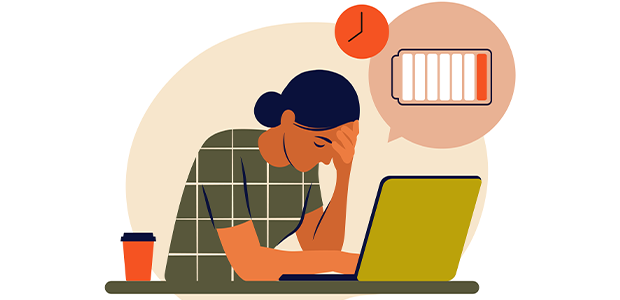
Finding Balance: Lessons from a Business Owner's Struggle with Stress
It was November. I'd just come back from almost two weeks in the Canary Islands. I should have felt refreshed and ready to get back into work at Hustle House – the people development consultancy I founded with my friend.
But what actually happened was that I developed a migraine and couldn't escape from the crushing feeling of a wall of work marching towards me. I felt myself panic and wrote an email at midnight to a coach I knew asking if I could arrange some sessions with him.
You might think it's not that unusual for a business owner, or anyone with any kind of responsible role, to be a bit stressed about coming back to work after two weeks' off. An exaggerated Sunday night blues, as it were. The thing is, I'd previously been signed off with stress twice in my professional life and so am highly attuned to the threat of it happening again. Terrified of it, actually.
The first time it happened, I was 34 and working for a financial services firm. I'd been there for eight years and absolutely loved my job. I got healthy salary increases, bonuses, and promotions. I felt well respected in the business, with my expertise and opinions sought regularly. It was challenging, but I was up for it. I was in my flow.
I don't remember exactly when the pressure tipped, and I felt myself falling. I think it was a combination of things including one of my team going on maternity leave earlier than expected, and my own physical health not being great (I was diagnosed later that year with endometriosis) but I began to falter. Projects I’d normally eat up felt overwhelming. Decisions felt impossible. I tried propping myself up through nights out with friends, but it got worse, and I found myself struggling to cope.
I was signed off with stress for a few weeks. I can't even remember how many now, all these years later. I do know that I went back for a day and was so upset by how I felt I went off again and eventually resigned. After eight years of service, I faded away from the job and company I'd loved. I felt like a failure. It took me almost a year to find another job and in that time my relationship ended, and I had to move house. six months later I was prescribed anti-depressants.
Fast forward nine years and I’m working at the head office of a huge retailer in a newly created role with a big remit. After an initial six months of getting stuck in and getting great feedback from my clients there, I found myself struggling with the workload. I remember being awake at 2am crying and furious with myself for feeling like I couldn't cope. Again. It got to the point where walking through the doors of the building made me feel sick. I ended up having a panic attack at just the thought of going to work one morning and so ended up getting signed off with stress again.
A few months after leaving that job I made the decision to step into the world of running my own business with my amazing ex-colleague and friend. It was absolutely incredible to have such freedom and control of what I did on a day-to-day basis – I couldn't believe I hadn't done it sooner.
Success followed and with it, a tonne of work to do. I tried my best to deal with everything, but, as many a control-freak-people-pleaser will know, that takes its toll. So, when I felt that advancing wall of work when I arrived back from Lanzarote on a Saturday night, I knew I had to take swift action.
I've been having coaching since then, on top of continuing to take the anti-depressants, and focusing on my physical wellbeing. It's a continual process of recognising triggers, unpicking unhelpful narratives, and challenging myself to do what I need to do to be at my best.
As a leadership coach, I often hear organisations talk about getting the most out of people. But people aren't dishcloths – they can't be wrung out! (Not my analogy so I can't take credit, but I love it). It should be about getting the best out of people, through interesting work, flexibility, trust and autonomy. Leaders need to tune in to their people and spot where they may need support and/or space too. That's a lifelong responsibility – not just for Mental Health Awareness month.

